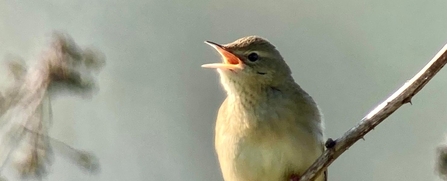
Photo © Stuart Davenport

Photo © Stuart Davenport
Whilst it still feels rather cool for the time of year, it does seem that spring has well and truly sprung and as we head into the month of May, Mother Nature has plenty of magical delights for us to enjoy. Meadows and verges and woodlands are resplendent with wildflowers, migratory birds that have arrived from afar are settling in for the breeding season and bees, butterflies and dragonflies will be on the wing – at least when its warm enough.
There’s so much to take in but, for me, the star of the show is the Dawn Chorus. With the bird breeding season building to its peak, with resident and migratory birds jostling for space and seeking to stand out from the crowd, the sheer variety and range of bird species using song to mark out territory or make their pitch for a mate coalesces to create a crescendo that is truly one of the wonders of nature.
Having enjoyed the dawn chorus for decades, I am particularly looking forward to it this year as it will be the first full season with the benefit of my digital hearing aids. Having experienced tinnitus, I got referred to the hearing clinic by my GP and was surprised to learn that I’d lost the ability to pick up some high frequencies and needed hearing aids in both ears. Shortly after I started wearing them, I was overcome by the melodic notes of a blackbird coming in crystal clear through the window and the realised that I’d been missing out on something I’d long taken for granted – the gift of bird song.
Earlier this year I was delighted when the Trust was approached to work with the RNID to promote World Hearing Day. I subsequently meet Geoffrey Marshall, a keen birdwatcher form Derby and a regular visitor to Attenborough Nature Reserve who was helping the charity raise awareness of the benefits of getting their hearing checked. According to the RNID, 76% of people enjoy hearing bird song and 68% believe that hearing birdsong and nature is important to maintaining wellbeing.

Geoffrey Marshall birdwatching at Attenborough Nature Centre for a photoshoot with RNID. credit Erin McDaid
Sadly, 1 in 5 of us have hearing loss, and for many people, like me, the loss is gradual and can be tricky to spot – with the high-pitched notes of birds often amongst the first things you lose. I hope the RNID’s campaign spotlighting Geoffrey’s joy at once again being able to enjoy birdsong encourages people to get their hearing checked. I’m so glad I did, and I will be making sure I’ve got fresh batteries in my hearing aids when I head out to take in the Dawn Chorus this year.
Whilst bird song can be heard through much of the day at this time of year, early mornings offer by the best opportunity to hear a wide range of species singing their hearts out. For those brave enough to set their alarms to an early enough hour, the experience of listening to birds just after dawn is special. Whilst the Dawn Chorus can be enjoyed in the comfort of a suburban garden – or even from the warmth of your bed if you throw the windows open - a trip to a local woodland, nature reserve or park with a mix of habitats, will reward the effort – I promise.
It is said that bird song travels up to 20 times further in the still of the morning air – aided by the lack of competing background noise, but to really make the most of it, you’ll really need get in to position as early as possible – 5am if you can bear it. I prefer to get settled early with a warm drink in hand, ready to catch the earliest performers including robins, thrushes and blackbirds. Unlike a music gig – whilst birds are often up first, they are no mere support act. They are talented songsters you really don’t want to miss. Once you’ve enjoyed the opening overture, the soundscape builds as other talents join the chorus including warblers such as chiff chaff, willow warbler and blackcap. I am no expert on bird song but whilst I might not be able to identify precisely which birds are singing at any one point, the variety of sounds and notes is breathtaking. Experiencing the dawn chorus with an expert adds another dimension but this is one natural experience that doesn’t require expert knowledge to enjoy.
By 6.30am some would say the chorus has peaked and the sheer wall of sound is staggering. Depending on your mindset you can now head of feeling virtuous or smug, to enjoy an early breakfast still accompanies by a backdrop of bird song that at any other time of year would be considered the headline act. Alternatively, you can head back to bed knowing you’ve savoured one of the UK’s best wild encounters.
Experience the Dawn Chorus with Nottinghamshire Wildlife Trust
Attenborough Nature Reserve
On Sunday May 5th between 5am and 9am we’re hosting a Dawn Chorus for Beginners event – a wonderful opportunity to enjoy this natural wonder in the company of an expert who can help you identify the different songbirds – making it an even more memorable experience. To top off the experience, guests will be treated to breakfast in the Nature Centre.
Idle Valley Nature Reserve
On Saturday May 11th between 5.15am and 7.45am we’ll then host a Dawn Chorus Walk at our largest site, the spectacular Idle Valley Nature Reserve near Retford.

©Mark Hamblin